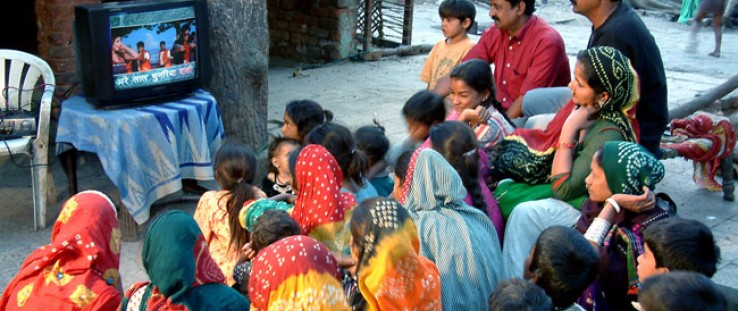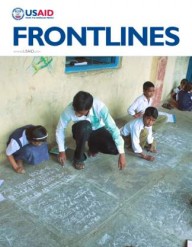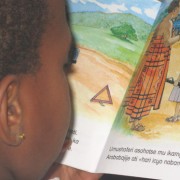 Reading, a by-product of entertainment: community viewing of Bollywood film songs with same-language subtitling in Gulbai Tekra slum, Ahmedabad, India.
Jaydeep Bhatt
Reading, a by-product of entertainment: community viewing of Bollywood film songs with same-language subtitling in Gulbai Tekra slum, Ahmedabad, India.
Jaydeep Bhatt
 Reading, a by-product of entertainment: community viewing of Bollywood film songs with same-language subtitling in Gulbai Tekra slum, Ahmedabad, India.
Jaydeep Bhatt
Reading, a by-product of entertainment: community viewing of Bollywood film songs with same-language subtitling in Gulbai Tekra slum, Ahmedabad, India.
Jaydeep Bhatt
Speeches Shim
PlanetRead’s Same-Language Subtitling
Country: India
Grant Amount: $300,000
Mission: To boost India’s low literacy rates through same-language subtitling of popular entertainment.
Whether referred to as the “idiot box” or the “tube,” much of television programming aimed at young people has earned a dubious reputation for turning the minds of the world’s children into wastelands.
Where others might see a brain drain, however, Brij Kothari, president of PlanetRead, sees a solution. “Our innovation—same-language subtitling—is deceptively simple,” explains
Kothari. “It is the idea of subtitling audio-visual
content in the same language as the audio. Every word is highlighted in perfect timing with the audio, causing a ‘What you hear is what you read’ effect.”
Same-language subtitling, or SLS, would be implemented on song-based programming that already exists on mainstream Indian television, that is, the Bollywood songs that already attract large numbers of primary grade-age viewers.
If it sounds a lot like karaoke, well, that’s because it is. But where karaoke has been used as entertainment in relatively affluent countries, and its cousin, closed-captioning, has primarily been used to provide mass media access for the hearing-impaired, SLS is the first to function as a purely educational tool, its founder says.
As an All Children Reading Grand Challenge prize winner, PlanetRead will use its $300,000 winnings to target SLS to children in the states of Karnataka and Andhra Pradesh, each of which has high television penetration and relatively static percentages of weak readers. In 2010, 40 percent of fifth grade students in Andhra Pradesh and 56 percent of fifth graders in Karnataka could not read a second-grade level text.
PlanetRead partners with television stations directly to get their same-language subtitling on the air. Channels send the organization their tapes a few days before broadcast, Kothari and his team add SLS to the songs in the programming, and then return the tapes for quality control before the subtitled segments air.
PlanetRead has regularly worked with Doordarshan, India’s national television network, but hopes to partner with the private sector so SLS can be added to India’s most popular television programs. Movies are PlanetRead’s preferred medium to subtitle, although they subtitle only the songs, not the dialogue.
“Movies tend to have significantly higher viewership than just back-to-back song programs. We recommend subtitling the song part only because people have an interest in knowing the lyrics of songs and singing along,” explains Kothari. “For a weak reader, songs are easier to read along with because some of the lines are already known to the viewer and can be anticipated. We thus build on a viewer’s prior knowledge.”
The Almodóvar Eureka
Kothari came upon his idea to improve literacy in India more than a decade ago.
“In 1996, as a doctoral student at Cornell University, I was watching the classic film [by the Spanish director Pedro Almodóvar], Women on the Verge of a Nervous Breakdown, with some friends. The dialogue was in Spanish and the subtitles in English. An idea literally popped out of the idiot box,” he said.
“As a Spanish language learner, I wished the subtitles were also in Spanish so as to catch the words better. Then I said something casually: ‘Maybe India would become literate if Bollywood film songs on TV were shown with the lyrics subtitled in the same language.’”
The offhand comment has guided Kothari’s work for the last 15 years. SLS was first implemented on a national program of Hindi film songs in September 2002 and continues to date. Between 2002 and 2012, it was implemented on a weekly program in seven states in eight languages throughout the country, including Hindi, Bengali, Gujarati, Marathi, Telugu, Tamil, Kannada and Punjabi.
PlanetRead estimates that, after scaling up to five weekly SLS programs with the All Children Reading Grand Challenge prize, the programs will reach 13.3 million children, 6 to 14 years old, in the states of Karnataka and Andhra Pradesh with two hours of reading practice a week, at a cost of only 10 cents per child annually.
The ‘Early-Literacy’ Epidemic
According to estimates, 37 percent of India’s population is literate, 26 percent is illiterate, and 37 percent is “early literate.” An early-literate person might recognize the sounds and letters of the alphabet, and even a few simple words, but cannot comprehend simple sentences. Those in that category might not, for example, be able to read the headline of a newspaper. They are functionally illiterate.
A 2011 annual status of education report conducted by Pratham and focusing on primary grades indicated that approximately 42.5 percent of rural Indian children in grades 3, 4 and 5 cannot read first-grade text. By grade 5, 51.8 percent cannot read second-grade text. According to PlanetRead’s research, a child who is a weak, or non-fluent, reader by the end of fifth grade tends to become an even weaker reader in youth and adulthood.
A problem of “national proportions,” says Kothari, demands just the sort of innovative approach that he and his team have developed. “From the get-go, any reading skills picked up in school are practiced the same night at home,” he says. “This ‘ping-pong’ of reading in school and on TV at home has been well-researched and scientifically proven to cause automatic … reading skill improvement.”
Kothari’s methodology boasts some encouraging results. In 2002, PlanetRead commissioned an independent impact study by Nielsen of 13,000 children in India with data collected from 2002-2007. The study showed that for those children without any exposure to SLS, 24 percent of the sample improved their reading ability after five years of schooling and 25 percent remained functionally illiterate. By contrast, 54 percent of students exposed to SLS improved their reading ability, and only 12 percent remained functionally illiterate.
“Our goal of improved reading skills of 100 million children is the challenge before us,” said Natasha de Marcken, director of USAID’s Office of Education. “All Children Reading showed us that there are innovators out there who are doing great work in the field of early-grade literacy. PlanetRead’s innovation is unique in that it is fun, entertaining, and most importantly, built on a sound evidence base.”
De Marcken thinks that Bollywood, as one of the largest centers of film production in the world, offers a unique opportunity to boost learning across the many cultures, countries and continents where it is consumed.
“To see this tapped as an educational tool is exciting and carries great potential for large-scale gains in reading," she said.
Kothari says that because SLS makes reading a by-product of regularly consumed entertainment, this approach requires no behavioral change and makes reading nearly inescapable. “The only way to avoid getting some reading practice is to stop watching Bollywood on TV,” says Kothari. “Try that in India.”




Comment
Make a general inquiry or suggest an improvement.